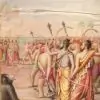Originally posted by: cuteamanboy
i read online
an interesting information
in valmiki ramayan
uttarkand
sita didn't conceive immediately after the return and coronation but it seems in the second year after coronation
quote
https://www.wisdomlib.org/hinduism/book/the-ramayana-of-valmiki/d/doc424813.html
While Sita and Raghava sported thus for a long time, the flowery season, that yields perpetual enjoyment, passed away and, as those two tasted every kind of felicity, Spring appeared once more. One day, having fulfilled the functions of state, that virtuous Prince returned to his palace where he spent the rest of the day. On her side, Sita, having worshipped the Gods and performed her morning duties, offering her services to all her mothers-in-law without distinction, thereafter adorned herself with marvellous jewels and re-joined Rama, like unto Saci when re-united with that God of a Thousand Eyes as he returns to his City Trivishtapa.
Beholding his consort glowing with beauty, Raghava experienced an unequalled delight and exclaimed “It is well!” then he addressed the lovely Sita, who resembled a daughter of the Gods, and said:—
“Now, O Vaidehi, that you dost bear a child in your womb, what dost you desire, O Lady of lovely hips? What pleasure can I prepare for you?”
Smiling, Vaidehi answered Rama, saying:—
“O Raghava, I wish to visit the sacred retreats of the Rishis of rigid penances, who dwell on the banks of the Ganges where they subsist on fruit and roots, and there I will throw myself at their feet, O Lord. O Kakutstha, it is my supreme desire even to pass a night in the hermitage of these ascetics who live on fruit and roots.”
Then Rama of imperishable exploits gave her permission to do so, saying:—
“Be at peace, O Vaidehi, to-morrow without fail, you shalt go there!”
Having answered Maithili, born of Janaka, in this wise, Kakutstha went to the central court surrounded by his friends.
It is saying
second spring
it means in second year
https://www.wisdomlib.org/hinduism/book/the-ramayana-of-valmiki/d/doc424840.html
Now, during the night that Shatrughna passed in the leaf-thatched hut, Sita gave birth to two children and, at midnight, the youthful ascetics brought the pleasant and auspicious tidings to Valmiki, saying:—
“O Blessed One, Rama’s consort has given birth to twin sons, do you perform the rites that will preserve them from evil forces.”
Hearing these words, the great Rishi went to see those newly-born Ones, who were as effulgent as the new moon and full of vigour, like unto twin offspring of the Gods.
Coming to w'here Sita was, on beholding those tw’o infants, his heart was filled with delight and he performed the Rakshasa Rite.1 Taking a handful of Kusha Grass with its roots, that Twice-born One, Valmiki, pronounced the formula of protection for the destruction of evil forces, saying:—
“Since they will rub the first born of the children with the Kusha Grass blessed by the aid of Mantras, his name shall be Kusha and, as the last born will be carefully dried by the female ascetics with the roots of the grass, he shall be called Lava. Therefore those two shall be called Kusha and Lava and, by these names that I have given them, they will become renowned.”
Thereafter, the female ascetics purified themselves and reverently received the grass from the hands of the Muni, applying it to the two children. The rite having been performed in the night, Shatrughna hearing the pleasant tidings, the names the children would bear, and Rama’s praises, also that Sita had undergone this double and fortunate birth, approached the leaf-thatched hut where Sita lay and said:—
“O Mother, be you happy!”
Thus, for the magnanimous Shatrughna, that night of the rainy season in the month of Shravana passed joyfully and rapidly and, the next day at dawn, that great hero, having offered up his morning devotions, with joined palms paid obeisance to the Sage and resumed his journey.
After a march of seven days, reaching the banks of the Yamuna, he halted at the hermitage of Rishis of great renown, and that illustrious Prince listened to the pleasant and ancient legends of Cyavana of the line of Bhrigu and of other Sages. In this way, Shatrughna, the son of that foremost of monarchs, King Dasaratha, in great delight, passed the night conversing with the ascetics, of whom Kancana was the leader, on various themes.
shatrughn met most probably and kids were born in shravan month
spring to rainy season
most probably
six months
it means
she left for the forest in third month of pregnancy
she conceived a year after the coronation





























